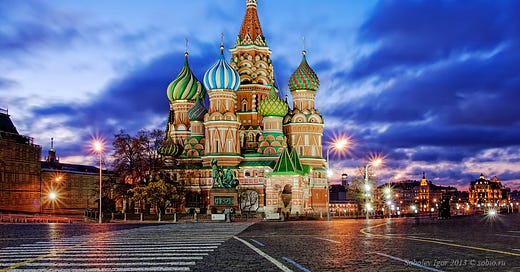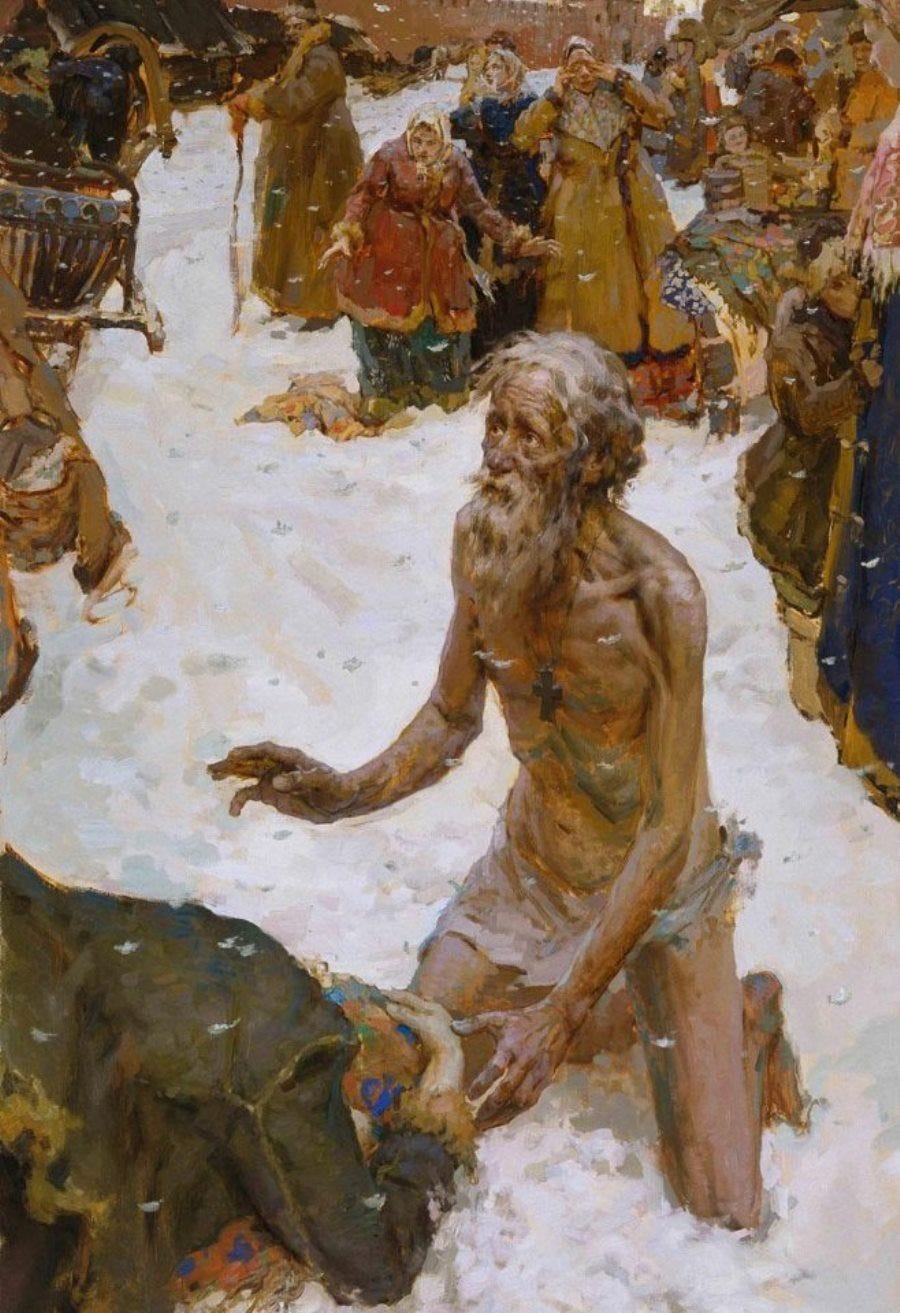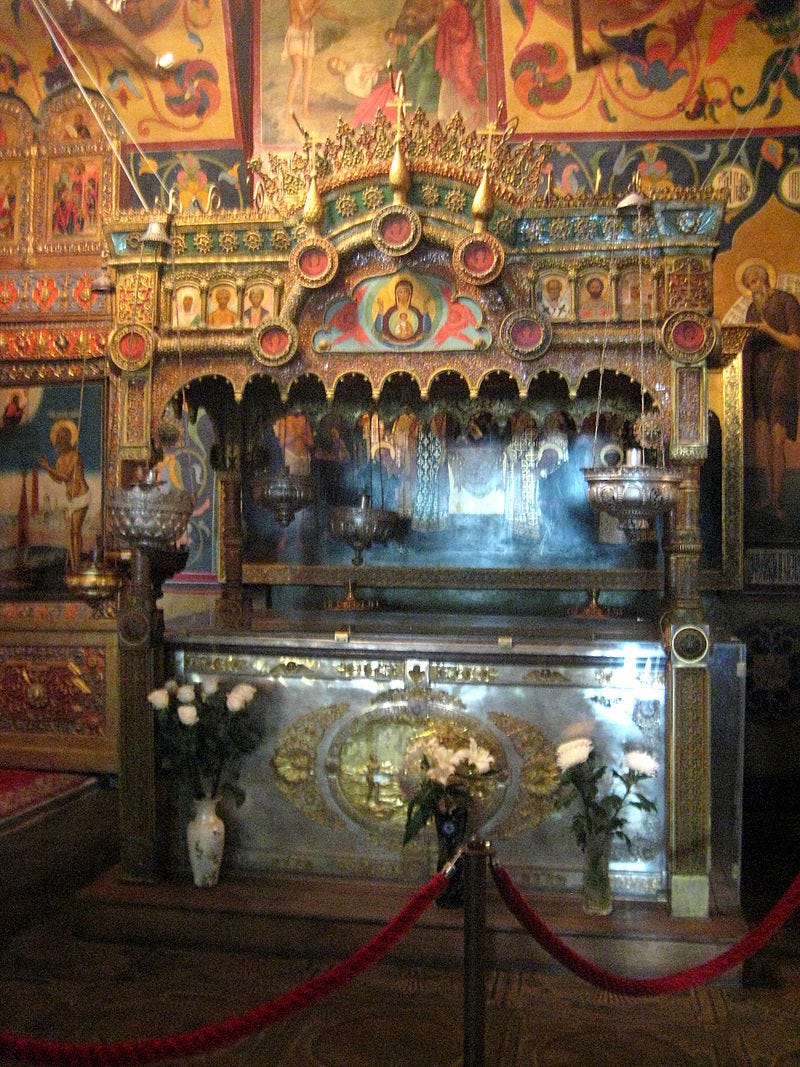This week saw the commemoration of St. Basil the Blessed, a Fool-for-Christ. Such saints, as a category, are some of the easiest hagiographies to absorb, with their revelatory antics and almost unbelievable feats of self-denial. But also significant is the story of those around St. Basil. As the most striking example, the Tsar - THE Tsar, Ivan “the Terrible”, more feared than any before him (and after), himself carried the funeral coffin of St. Basil, the naked fool, upon his death. There may not have been anyone on earth who this Tsar feared but Basil. From the time of Alexei Mikhailovich on, such humility and reverence from the autocrat in the presence of a holy fool would be unthinkable due to the general spiritual decay.

Saint Basil the Blessed, the Wonderworker of Moscow, sometimes referred to as "Basil the Naked," was born in December 1468 on the porch of the Yelokhovo Church, dedicated to the Vladimir Icon of the Most Holy Theotokos (now within the city limits of Moscow), where his mother had come to pray for a "safe delivery." The date is determined based on the majority of sources indicating that the "years of the blessed one’s life" were 88. Since the year of his death, 7065 (1557 AD), is undisputed, we arrive at 7065-88=6977 (1468 AD). His parents, Jacob and Anna, were simple peasants, and they apprenticed him to a shoemaker. The hagiography tells us that Basil was a diligent and God-fearing youth who was granted the gift of foresight, which manifested unexpectedly. While learning his trade, an extraordinary event occurred, witnessed by his master, revealing that his apprentice was no ordinary person. A merchant brought grain to Moscow on barges and visited the workshop to order boots, asking that they be made sturdy enough to last a year. Basil wept and said, "We shall make you such boots that you will not wear them out." When his master questioned him, Basil explained that the customer would not live to wear the boots, as he would soon die. A few days later, the prophecy came true.
At the age of 16, Basil came to Moscow and began the arduous ascetic feat of foolishness for Christ. The venerable one demonstrated by his example that it is not the place that saves a person or hinders salvation, but rather a pious person sanctifies any place, for he lived in the city as if in a desert and dwelt among the people as though in a monastery of penitents. In the scorching summer heat and the biting winter frost, he walked naked and barefoot through the streets of Moscow. His actions were strange: he would overturn a vendor's stall of bread rolls or spill a jug of kvass. The angry merchants would beat the blessed one, but he joyfully accepted the beatings and thanked God for them. Later, the baker confessed that he had been mixing chalk and lime into the flour, and the kvass was also made improperly.
Once, Saint Basil shattered an icon of the Most Holy Theotokos at the Varvarin Gate, which had long been considered miraculous. A crowd of pilgrims, who had come from all over Rus' seeking healing, attacked him and began to beat him "to death." The fool for Christ said, "Scrape off the paint!" When they removed the paint, they found that beneath the image of the Theotokos was hidden a "demonic face."
One of Moscow’s noblemen was fond of the blessed Basil, and Basil often visited him. One day, when the fool for Christ came to him during a severe frost, the nobleman begged him to at least cover his nakedness in such harsh weather. "Do you truly wish this?" "I truly wish," the nobleman replied, "for you to clothe yourself in my garments, for I love you with all my heart." The blessed one smiled and said, "Very well, my lord, do as you wish, for I love you too." The nobleman rejoiced and brought out his own fur coat, covered in red cloth, and Basil, putting it on, walked through the streets and squares of the city. Wicked men, noticing that the saint was wearing a fine coat, plotted to trick him out of it; one of them pretended to be dead, and the others asked Basil for the coat to cover the deceased for burial. Basil indeed covered the "dead" man with his coat, but seeing through the deception, he said, "The fox fur coat, cunning, cover this cunning fox's deed. You are now dead for your deceit, for it is written: 'The deceitful shall perish.'" When the wicked men removed the coat, they found that their friend was truly dead.
A certain merchant decided to build a stone church on Pokrovka in Moscow, but the vaults collapsed three times. The merchant sought advice from the blessed one, and Basil directed him to Kyiv: "Find there the poor man John; he will give you advice on how to complete the church." Upon arriving in Kyiv, the merchant found John, who was sitting in a poor hut rocking an empty cradle. "Whom are you rocking?" the merchant asked. "My dear mother, I am repaying the immeasurable debt for birth and upbringing." Only then did the merchant remember his own mother, whom he had driven out of his house, and it became clear to him why he could not complete the church. Upon returning to Moscow, he brought his mother back home, asked for her forgiveness, and completed the church.
The veneration of Blessed Basil quickly grew: he was recognized as a fool for Christ, a man of God, and a reprover of unrighteousness.
"The true testimony is even borne by the enemy," sings the Holy Church, praising Blessed Basil. Indeed, even the enemies of Christ revealed the miraculous power of God through the visible intercession of the blessed one. It so happened that a Persian ship, with many people aboard, was sailing on the Caspian Sea. A strong storm arose, and the waves began to flood the ship. The helmsman could not steer the ship, having lost his way in the turbulent storm—there was no longer any hope of salvation. Among the Persians were several Orthodox Christians, and in their moment of danger, they remembered Blessed Basil and said to the unbelievers sailing with them: "There was a blessed Basil in our land of Rus', in Moscow, who walks on the waters, and the waves obey him: he has great boldness before Christ our God and is able to save our ship, overwhelmed by the waves, and deliver us from drowning." No sooner had they spoken these words than they saw a naked man standing on the waters, who, taking hold of their ship's helm, guided it through the stormy waves. Soon, the waves calmed and the wind ceased, and all were saved from imminent death. When the Persians returned to their land, they told their ruler about the miracle. The Shah wrote to Tsar Ivan the Terrible about this, and when some of the saved Persians came to Moscow on business, they recognized Blessed Basil on the streets of the city as the very man who had saved them from drowning.
Preaching mercy, the blessed one helped first of all those who were ashamed to ask for alms but were in need of help more than others. On one occasion, he gave the rich royal gifts to a foreign merchant who had lost everything and, although he had not eaten for three days, could not bring himself to ask for help because he was dressed in fine clothes.
The blessed one severely condemned those who gave alms for selfish reasons, not out of compassion for poverty and misfortune, but in the hope of easily attracting God's blessing on their affairs. Once, the blessed one saw a demon who had taken the form of a beggar. The demon sat at the Prechistensky Gates and offered immediate help in business to all who gave him alms. The blessed one discerned the deceitful trick and drove the demon away. For the salvation of others, Blessed Basil even visited taverns, where he sought to find the seed of goodness in the most fallen of people, to encourage and comfort them. Many noticed that when the blessed one passed by a house where wild revelry and drunkenness were taking place, he would tearfully embrace the corners of that house. When asked what this meant, the fool for Christ replied: "Angels of sorrow stand by the house and grieve for the sins of the people, and I, with tears, beseech them to pray to the Lord for the conversion of the sinners."
By great ascetic feats and prayer, the blessed one purified his soul and was granted the gift of foreseeing the future. When the venerable one secretly walked to holy churches at night for prayer, the church doors would open by themselves for him, as a good intercessor. A chronicler recounts a miraculous vision that God revealed to Blessed Basil in 1521 before the terrible invasion of Mahmet-Girey. One night, he came to the Cathedral Church of the Most Holy Theotokos and stood before the holy gates for a long time, gazing mournfully at them and silently offering a tearful prayer to God. Then, some who stood near him heard a great noise inside the church and saw terrifying flames emanating from all its windows, so that the entire church seemed to be on fire, but after a while, the flames subsided. At another time, the chronicler recounts, the merciful God, who does not wish for our ultimate destruction but that we should turn from wickedness and not rely on fleeting wealth, allowed a terrible fire to occur on June 21, 1543, and once again, Blessed Basil had a timely revelation about it.
After these fires, at noon on July 8, the blessed one came to the Monastery of the Exaltation of the Holy Cross, stood before the doors of the church, which at that time were wooden, and gazed at them, weeping inconsolably. The passersby were astonished, not understanding the reason for his tears, and only later did they learn when, the next day, a terrible fire broke out, and the flames from the church spread to the neighboring streets. Neglinnaya, the Great Posad, the entire Great Market, and even the Tsar's palace along with the Metropolitan's residence—all were consumed in the blink of an eye: not only the wooden churches but also the stone ones crumbled, and iron melted like tin.
No matter how hard he tried to conceal the height of his virtue through his foolishness, Blessed Basil could not hide, for, as the Gospel says, a city set on a hill cannot be hidden. Once, on the day of the tsar's name day, Blessed Basil was invited to the palace. He took a health-giving cup in his hand and three times poured it out of the window, arousing the tsar's indignation, who thought that the blessed one was showing contempt for him. But Saint Basil boldly said to the ruler: "Cease from your anger, O tsar, and know that by pouring out this drink, I extinguished the fire that engulfed all of Novgorod, and the conflagration has ceased." Having said this, he rushed out of the tsar's palace; those who pursued him could not catch him, for when he reached the Moscow River, he walked straight across the waters and became invisible. The tsar, who saw this from his tower, was horrified. Though he regarded Basil as a holy man, he doubted the truth of what the blessed one had said about the fire in Great Novgorod, and, noting the day and hour, he sent a messenger there. Only then was the truth revealed. The townspeople testified to the messenger that during the general conflagration of the city, a naked man suddenly appeared with a water jug, pouring water on the flames, and they were extinguished. This was the very day and hour when the venerable one fled from the tsar's feast. The tsar was then filled with even greater reverence for Blessed Basil. Some time later, people from Novgorod came to Moscow, and they recognized Saint Basil as the very one who had extinguished the fire in their city. The entire populace glorified the Lord, who is wondrous in His saints.
It came into the Tsar’s mind to build himself a house on the Sparrow Hills, and he began the construction. One holiday, while in church, the Tsar was pondering how to complete the building in a splendid manner. Saint Basil also came to that same church, and hiding from the Tsar’s sight, stood in a corner, observing the Tsar with his inner eye, discerning what was happening in his thoughts. After the Divine Liturgy, the Tsar returned to his chambers, and Blessed Basil followed him. The sovereign began to question him: "Where were you during the liturgy?" The blessed one replied, "I was where you were." When the Tsar said that he did not see him, the blessed one retorted, "But I saw you, and not only in the church but also where you truly were, whether in the church or elsewhere." "I was nowhere but in the church," the Tsar said. "No," the blessed one rebuked, "I saw you in your thoughts, wandering on the Sparrow Hills and building your palace. Thus, you were not in the temple of the Lord, while Basil was there, for after the singing of 'Let us lay aside all earthly cares,' he worshiped God with the holy Cherubim, thinking of nothing earthly. To stand in the church and think of worldly matters is not to be in it." The Tsar was moved and said, "So it truly was with me," and he grew even more fearful of the blessed one as a revealer of his secret thoughts.
Contemporaries noted that this was perhaps the only man whom Tsar Ivan the Terrible feared. Tsar Ivan Vasilievich the Terrible revered and feared Blessed Basil, "as one who could foresee the hearts and thoughts of men." When, shortly before his death, Basil fell into a grave illness, the Tsar himself visited him along with Tsarina Anastasia.
Blessed Basil passed away on August 2, 1557, and was buried by Metropolitan Macarius, with much clergy, near the Intercession Cathedral, which from that time to the present day, the people call the Church of Basil the Blessed. Ivan the Terrible and the boyars carried his coffin, while Metropolitan Macarius conducted the burial service.
From 1588, there began to be reports of miracles occurring at the grave of Blessed Basil.
Blessed Basil was canonized on August 2, 1588, by a council led by the most holy Patriarch Job. The commemoration of Basil the Blessed in Moscow was celebrated with great solemnity: the Patriarch himself officiated, and the Tsar would usually be present at the service.
Descriptions of the saint's appearance have preserved characteristic details: "naked, with a staff in hand." The veneration of Blessed Basil was always so strong that the Trinity Church and the adjoining Intercession Church are still referred to as the Church of Basil the Blessed.
It is said that the chains (verigi) of Basil the Blessed are kept in the cathedral. This is not true. There could not be any, because Basil the Blessed walked naked, covered only by rags, in both heat and cold. He did not wear chains.






Glory to God. St Basil, please pray for us.